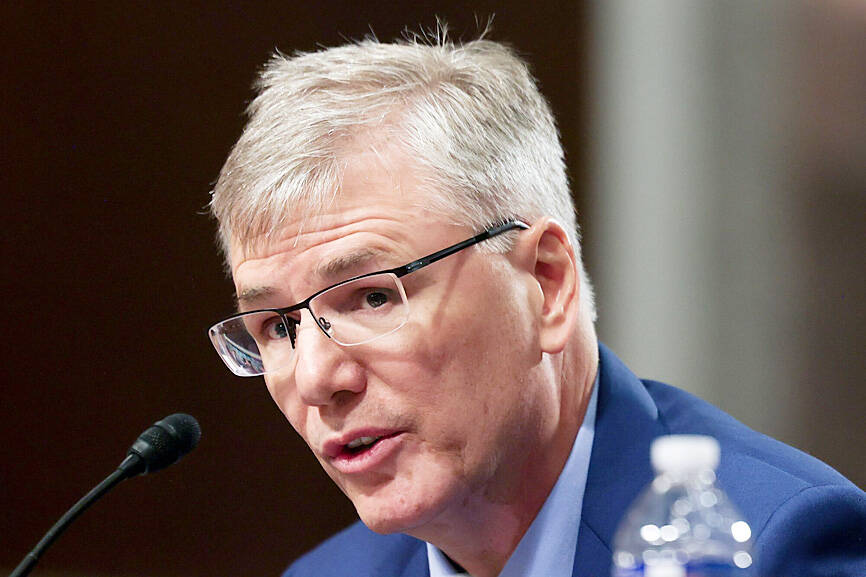US National Reconnaissance Office Deputy Director Troy Meink, who has been nominated by US President Donald Trump to serve as secretary of the US Air Force (USAF), on Thursday emphasized the importance of uncrewed systems in deterring conflicts across the Taiwan Strait.
During his nomination hearing at the US Senate Armed Services Committee, Meink described the Taiwan Strait as a highly contested and sensitive region, warning that the potential for Chinese military action against Taiwan remains a serious threat to regional and global stability.
“Unmanned systems play a critical role in deterring conflict in the region, but the systems’ effectiveness depends on addressing the challenges and limitations associated with their use,” Meink said.

Photo: Bloomberg
Meink proposed a comprehensive strategy for the US, including the development of advanced uncrewed systems, enhanced command and control, improved cybersecurity and resilience, and integration of uncrewed systems with other warfighting capabilities to fully leverage their potential.
Meink said that threats from the Chinese People’s Liberation Army Rocket Force to USAF personnel and facilities are increasing, driven by the growing number, variety, range and sophistication of missiles China produces each year.
Although the USAF has made progress in addressing the Chinese missile threat, there is more to be done, he said.
Meink said he believes China poses the largest military threat to the US and its allies in the Indo-Pacific region, as Beijing has spent the past two decades studying Washington, which focused primarily on countering violent extremism during the same period.
China has “used that time to modernize and attempt to catch up in terms of both capability and capacity,” Meink said.
“Their aggressive behavior in places like the South China Sea conspicuously demonstrates a willingness to use military hard power to achieve their national security objectives,” he added.
Meink said that his top concern is the timeline of China’s military development, adding that if the US cannot shorten its development timelines, Beijing would likely continue closing the gap with Washington.
The Washington Times on Thursday reported that if a war breaks out across the Taiwan Strait, the US outpost of Guam would likely become a major target of Chinese missiles.
When asked about Guam’s role in a potential conflict with China, Meink said that the US territory is a critical location, enabling the projection and sustainment of air power from the front lines of the Indo-Pacific region to bolster the USAF’s posture west of the International Date Line.
“My understanding is that significant infrastructure improvements have already been made at Andersen [USAF Base in Guam], but further enhancements including ongoing upgrades to its airfields, increasing support facilities, and expanding fuel and munitions storage capacity are vital to ensure robust resiliency and operational continuity in contested environments,” Meink said.
Defense News reported that Meink, who joined the USAF in 1988, is a US Department of Defense insider with “deep acquisition and technology-development experience.”

A preclearance service to facilitate entry for people traveling to select airports in Japan would be available from Thursday next week to Feb. 25 at Taiwan Taoyuan International Airport, Taoyuan International Airport Corp (TIAC) said on Tuesday. The service was first made available to Taiwanese travelers throughout the winter vacation of 2024 and during the Lunar New Year holiday. In addition to flights to the Japanese cities of Hakodate, Asahikawa, Akita, Sendai, Niigata, Okayama, Takamatsu, Kumamoto and Kagoshima, the service would be available to travelers to Kobe and Oita. The service can be accessed by passengers of 15 flight routes operated by

Chinese spouse and influencer Guan Guan’s (關關) residency permit has been revoked for repeatedly posting pro-China videos that threaten national security, the National Immigration Agency confirmed today. Guan Guan has said many controversial statements in her videos posted to Douyin (抖音), including “the red flag will soon be painted all over Taiwan” and “Taiwan is an inseparable part of China,” and expressing hope for expedited reunification. The agency last year received multiple reports alleging that Guan Guan had advocated for armed reunification. After verifying the reports, the agency last month issued a notice requiring her to appear and explain her actions. Guan

GIVE AND TAKE: Blood demand continues to rise each year, while fewer young donors are available due to the nation’s falling birthrate, a doctor said Blood donors can redeem points earned from donations to obtain limited edition Formosan black bear travel mugs, the Kaohsiung Blood Center said yesterday, as it announced a goal of stocking 20,000 units of blood prior to the Lunar New Year. The last month of the lunar year is National Blood Donation Month, when local centers seek to stockpile blood for use during the Lunar New Year holiday. The blood demand in southern Taiwan — including Tainan and Kaohsiung, as well as Chiayi, Pingtung, Penghu and Taitung counties — is about 2,000 units per day, the center said. The donation campaign aims to boost

The Central Weather Administration (CWA) said a magnitude 4.9 earthquake that struck off the coast of eastern Taiwan yesterday was an independent event and part of a stress-adjustment process. The earthquake occurred at 4:47pm, with its epicenter at sea about 45.4km south of Yilan County Hall at a depth of 5.9km, the CWA said. The quake's intensity, which gauges the actual effects of a temblor, was highest in several townships in Yilan and neighboring Hualien County, where it measured 4 on Taiwan's seven-tier intensity scale, the CWA said. Lin Po-yu (林柏佑), a division chief at the CWA's Seismological Center, told a news conference